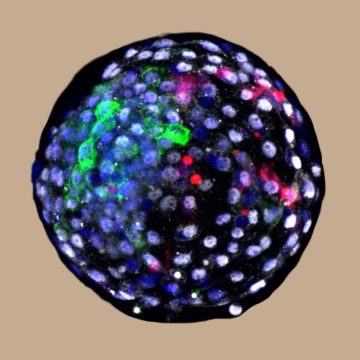Nidhi Subbaraman in Nature:
 Scientists have successfully grown monkey embryos containing human cells for the first time — the latest milestone in a rapidly advancing field that has drawn ethical questions.
Scientists have successfully grown monkey embryos containing human cells for the first time — the latest milestone in a rapidly advancing field that has drawn ethical questions.
In the work, published on 15 April in Cell1, the team injected monkey embryos with human stem cells and watched them develop. They observed human and monkey cells divide and grow together in a dish, with at least 3 embryos surviving to 19 days after fertilization. “The overall message is that every embryo contained human cells that proliferate and differentiate to a different extent,” says Juan Carlos Izpisua Belmonte, a developmental biologist at the Salk Institute for Biological Studies in La Jolla, California, and one of the researchers who led the work. Researchers hope that some human–animal hybrids — known as chimaeras — could provide better models in which to test drugs, and be used to grow human organs for transplants. Members of this research team were the first to show in 20192 that they could grow monkey embryos in a dish for up to 20 days after fertilization. In 2017, they reported a series of other hybrids: pig embryos grown with human cells, cow embryos grown with human cells, and rat embryos grown with mouse cells3.
…In the study, researchers fertilized eggs extracted from cynomolgus monkeys (Macaca fascicularis) and grew them in culture. Six days after fertilization, the team injected 132 embryos with human extended pluripotent stem cells, which can grow into a range of cell types inside and outside an embryo. The embryos each developed unique combinations of human and monkey cells and deteriorated at varying rates: 11 days after fertilization, 91 were alive; this dropped to 12 embryos at day 17 and 3 embryos at day 19.
More here.
